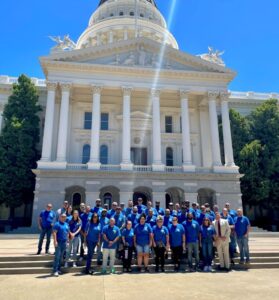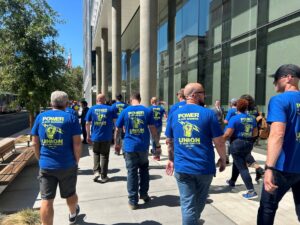When lawmakers in Sacramento are faced with policy decisions that impact IBEW 1245 members, our union never hesitates to make sure our voice is heard.
This year, IBEW 1245’s biggest legislative priority — and success — was beating back SB 284 (Wiener). As most members know, the language of SB 284 invalidated our existing collective bargaining agreements by restricting investor owned utilities (IOUs), which are highly unionized, to use only one type of labor agreement when contracting out work. Worse, the language specifically permits non-union contractors to bid public utility work – work that is currently done by union signatory contractors. For Local 1245 members, all PG&E work would be done by non-IBEW contractors. Thanks in large part to the advocacy of our members and leaders, SB 284 failed to advance this year, and IBEW 1245 leadership is remaining vigilant to defeat any future iterations of this union-busting bill.
We also successfully advocated for the passage of several bills that will further work done by IBEW 1245 members, including:
SB 410 (Becker) Powering Up Californians Act. SB 410 requires PG&E and other Investor Owned Utilities (IOUs) to immediately reduce the severe backlog of customer requested work and prevent future unreasonable delays. The IOUs will be required to complete requested work sooner and significantly increase capacity on their electric grid. Further, the bill requires the California Public Utilities Commission (CPUC) to monitor and penalize utilities who fail to fulfill the mandate. The bill also puts into place additional guardrails that protect ratepayers from increased electricity costs. IMPACT: This bill will require billions of dollars in investment by PG&E and other IOUs in their electric distribution systems to meet California clean energy goals and connect customers in a timely manner. California is committed to electrifying its transportation and construction or building sectors, which will significantly increase the amount of electricity consumed. All this investment will become part of PG&E’s rate base, which will benefit 1245 members for many years to come. Learn more about 1245’s role in the passage of SB 410.

IBEW 1245 showed up in force to support SB 410.
AB 1373 (Garcia) Energy; Central Procurement. The bill makes a significant change in who will buy electricity for Californians in the future. California has faced a power supply shortage for the last five years, and that will only get worse in the future as more GHG-free electricity is needed to keep growing the California economy. The solution, as outlined in AB 1373, is central procurement, with the California Department of Water Resources (DWR) procuring the electricity — both for long-term baseload as well as procuring what’s known as “Resource Adequacy” energy to meet the state’s need 24/7, especially on high-load days. The bill also extends “skilled and trained” language regarding the work associated with constructing and maintaining the energy generation projects DWR uses. DWR is the single largest user of electricity in the State of California, and it also generates and sells electricity. As a state agency that is tasked with buying all types of clean energy from all over California, DWR knows the energy market and can function both as a short-term and long-term supplier; it can also drive lower pricing; and it has access to capital at lower costs than the IOUs. IMPACT: This bill will be very beneficial for IBEW members and members of other trade unions by requiring “skilled and trained” workers to build and maintain new electric generation projects built to generate the 70 gigawatts of electricity (which is what’s needed for California’s future load). Learn more about 1245’s role in the passage of AB 1373.

Members head into the Capitol to express support for AB 1373
SB 740 (Cortese) Hazardous materials management. In 2014, Governor Brown signed a historic law, SB 54, to establish “skilled and trained” workforce requirements for contractors performing work in refineries. AB 54 has helped to professionalize these workers and make these facilities safer for workers and the surrounding community. This bill expands the SB 54 prevailing wage and “skilled and trained” requirements for all workers in other similar facilities such as chemical plants, as well as clean fuels manufacturing facilities, and facilities employing carbon capture utilization and storage. IMPACT: For 1245 members and the IBEW at large, this will be very helpful to keep new work as opportunities to expand from existing natural gas facilities into hydrogen or other clean fuel uses. California just received $1.2 Billion in federal funds to invest in clean hydrogen. Those funds will be matched by private investment of over $8 Billion more, meaning $10+ billion will be spent in California building out/adapting existing infrastructure for hydrogen. SB 740 will help ensure this future work to be done by union. Learn how IBEW 1245 members at NCPA’s Lodi Energy Center are at the forefront of the hydrogen revolution.
SB 49 (Becker) Renewable Energy. This bill requires the California Department of Transportation, in coordination with the State Energy Resources Conservation and Development Commission and the Public Utilities Commission, to determine impediments to the development of land within department-owned rights-of-way for renewable energy generation facilities, energy storage facilities, and electrical transmission and distribution facilities. The bill requires Caltrans to consider the department owning the facilities, or leasing, granting easements, or entering into joint-use agreements with public utilities or other entities for this purpose. IMPACT: Construction of new renewable energy or energy storage facilities requires interconnection to the grid. This is more work for 1245 members and all the IBEW locals in California, as this is state work subject to “skilled and trained” language.
ACA 1 (Aguiar-Curry) Local government financing: affordable housing and public infrastructure: voter approval. This measure would create an additional exception to the Constitutional 1% limit that would authorize a city, county, city and county, or special district to levy a tax to service bonded indebtedness incurred to fund the construction, reconstruction, rehabilitation, or replacement of public infrastructure, affordable housing, including downpayment assistance, or permanent supportive housing, or the acquisition or lease of real property for those purposes, if the proposition proposing that tax is approved by 55% of the voters of the city, county, city and county, or special district, as applicable, and the proposition includes specified accountability requirements. This measure must be approved by California voters as an initiative in the November 2024 election. IMPACT: California has a huge shortage of housing. Much of the local infrastructure that serves housing units, including water, sewer, energy is in poor condition. General obligation bonds raise funds to pay for this work. This measure will spur huge construction projects, which in turn require larger energy infrastructure and interconnection to the grid, thereby creating more work for Local 1245 members.
–Hunter Stern, IBEW 1245 Assistant Business Manager